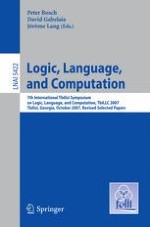Edited in collaboration with FoLLI, the Association of Logic, Language and Information, this book constitutes the refereed proceedings of the 7th International Tbilisi Symposium on Logic, Language, and Computation, TbiLLC 2007, held in Tbilisi, Georgia, in October 2007.
The 22 revised full papers included in the book were carefully reviewed and selected from numerous presentations given at the symposium. The focus of the papers is on the following topics: conceptual modeling of spatial relations, pragmatics and game theory, atypical valency phenomena, lexical typology, formal semantics and experimental evidence, exceptional quantifier scope, Georgian focussing particles, polarity and pragmatics, dynamics of belief, learning theory, inquisitive semantics, modal logic, coalgebras, computational linguistics of Georgian, type-logical grammar and cross-serial dependencies, non-monotonic logic, Japanese quantifiers, intuitionistic logic, semantics of negated nominals, word sense disambiguation, semantics of question-embedding predicates, and reciprocals and computational complexity.
